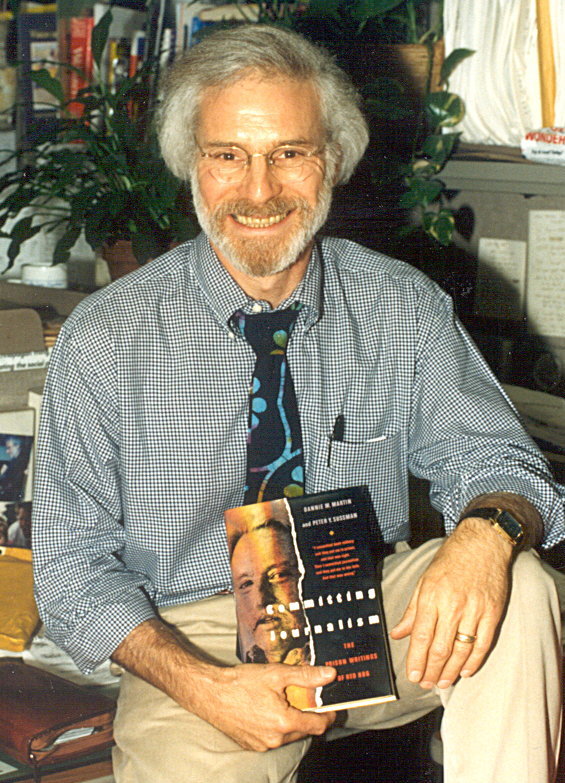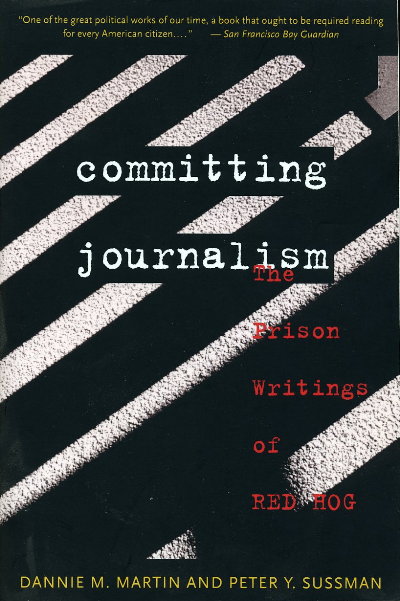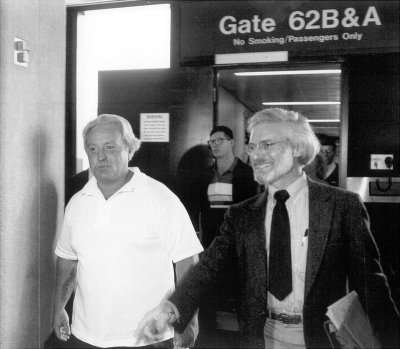Committing Journalism
“One of the great political works of our time” — S.F. Bay Guardian
Committing Journalism:
The Prison Writings of Red Hog
By Dannie M. Martin and Peter Y. Sussman
(W.W. Norton, 1993 hardbound, 1995 paperback)
Dannie Martin was a bank robber, a heroin addict, a longtime federal prisoner and, he later wrote, “a criminal by any definition I know of.” But in 1986, the self-educated convict’s life changed dramatically when he submitted a freelance article on AIDS in prison to San Francisco Chronicle editor Peter Sussman. That article began a years-long collaboration in the course of which Martin wrote more than 50 eloquent and revealing profiles of prison life. Along the way, Martin and Sussman ran afoul of federal prison authorities, who threw the author into the hole two days after he criticized his warden in print. What followed was a high-profile First Amendment lawsuit. As Martin later framed the issue: “I committed bank robbery and they put me in prison, and that was right. Then I committed journalism and they put me in the hole. And that was wrong.”
and, he later wrote, “a criminal by any definition I know of.” But in 1986, the self-educated convict’s life changed dramatically when he submitted a freelance article on AIDS in prison to San Francisco Chronicle editor Peter Sussman. That article began a years-long collaboration in the course of which Martin wrote more than 50 eloquent and revealing profiles of prison life. Along the way, Martin and Sussman ran afoul of federal prison authorities, who threw the author into the hole two days after he criticized his warden in print. What followed was a high-profile First Amendment lawsuit. As Martin later framed the issue: “I committed bank robbery and they put me in prison, and that was right. Then I committed journalism and they put me in the hole. And that was wrong.”
In Committing Journalism: The Prison Writings of Red Hog (published by W.W. Norton in hardback in November 1993 and in paperback in June 1995), Martin and Sussman reprint Martin’s riveting prison articles and tell the behind-the-scenes story of their collaboration and their long struggle to assure the First Amendment rights of prisoners and newspapers. Theirs is a story of personal risk and drama — and unlikely friendship — as well as the record of a path-breaking legal dispute. The most eloquent testimony to the significance of their struggle is in Martin’s powerful essays from inside the joint.
———-
EXCERPTS FROM COMMITTING JOURNALISM:
It’s easy for a judge to say “20 years” or “30 years.” It takes only a few seconds to declare. It’s also easy for the person in the street to say: “Well, this criminal has harmed society and should be locked up for a long time.”
The public is unable to imagine what the added time does to a convict and what it does to his family.
Two years is a lot of time. Twenty or 30 years is a Mount Everest of time, and very few can climb it. And what happens to them on the way up makes one not want to be around if and when they return.
— Dannie Martin
It is almost axiomatic that depersonalized people are capable of barbaric acts. If we continue to assume that every lawbreaker—or every lawbreaker who doesn’t wear a white collar—is Jack the Ripper, then we can expect to find many more criminals acting out the roles to which we have relegated them.
— Peter Sussman
The real issues, I believe, are: (1) Does a convict have a First Amendment right to publicly define himself and his surroundings? And (2) does the public have a First Amendment right to hear a prisoner’s viewpoint. … Any permanent harm that comes to us all won’t be because of what we talk about. It will come from what was passed over in silence.
— Dannie Martin
Before 1986, society defined Dannie Martin. When he began to define himself—as a writer—the government tried to take away his name and stop his writing. That action jeopardized society’s interests, and it threatened the hope he represented for other convicts.
In his dispatches from prison, Dannie did not exonerate his fellow prisoners. But he gave them back their names and personalities and families and the same vulnerable emotions we all have. He restored their human complexity. That may be the first step out of our quagmire of crime and punishment.
— Peter Sussman
———-
REACTION TO COMMITTING JOURNALISM:
From The Washington Post:
“The whole is considerably more than the sum of the parts, for Martin’s pungent essays coalesce into Sussman’s sensitive narrative to form a poignant story of mutual discovery and self-discovery. As Sussman puts it, ‘a junkie who has spent most of his adult life inside prisons and an editor who had seen prisons only from a car window’ found themselves in a ‘dialogue about crime and punishment in this culture that has had too much of each.’ ”
From San Francisco Bay Guardian:
“Committing Journalism is one of the great political works of our time, a book that ought to be required reading for every American citizen.”
Wilbert Rideau, Editor Emeritus, The Angolite, Louisiana State Prison, Angola:
“This is a true tale of a man with the balls to point out the emperor’s nakedness, and the emperor’s efforts to squash him. Convict-writer Dannie ‘Red Hog’ Martin paints prisoners and their keepers in living color, showing them as human beings with the needs, desires, faults and foibles we all share. … Committing Journalism is a significant contribution to public understanding of the people who live, work and die in prison.”
Carl Jensen, Founding Director, Project Censored, California State University, Sonoma:
“Committing Journalism obviously should be a required text for all criminal justice programs in our universities; more important, however, it should be a required text in all our journalism programs. It is both a stirring reminder of the dedication it takes to become a real journalist and, at the same time, a case study of news media censorship. … [A] powerful reminder of how vulnerable our society is to control freaks. We all owe Dannie Martin and Peter Sussman an enormous debt for their fight to preserve the First Amendment.”
From The Boston Phoenix:
“Committing Journalism is one hell of a book.”
Author Jessica Mitford:
“At last we have some first-rate description of life behind those clanging gates—but far more than that, we have the remarkable story of how and why Dannie Martin’s prison writings got published by an intrepid editor, Peter Sussman, in the face of almost unbelievable roadblocks erected by the Federal Bureau of Prisons. It is not only an exciting, well-told story—it may well prove to be one of those rare phenomena, a book that could become a catalyst for real reform. I only wish that a copy could be placed in the in-basket of every member of President Clinton’s staff, cabinet, and above all of our Attorney General.”
Professor Norman Dorsen, ACLU President, 1976-91:
“A gripping read. All the learned reports and conferences in the world will not provide as vivid a sense of the tensions, cruelties and humor of prison as Red Hog’s firsthand tales.”

Sussman welcomed Martin at San Francisco airport after the prison writer’s release from the Federal Correctional Institution in Phoenix
———-